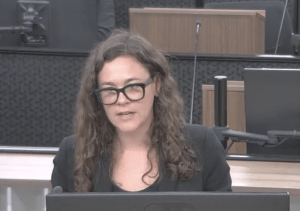ICAC has opened a public hearings into the use of contingent workers and the awarding of construction contracts at Canterbury Bankstown Council between 2020-22.

The inquiry will investigate allegations of corrupt conduct and conflict of interest including partial or dishonest exercise of official functions, failure to disclose pecuniary interests, and unfair practices in council contracts, Commissioner Helen Murrell SC said.
At the centre of the inquiry are Benjamin Webb, former manager of works and projects, and Pietro Cossu, who was contracted to work as construction team leader at the time, the commission heard on Monday.
Also under the spotlight are a number of companies including PMLV Invest & Const, of which Mr Cossu was the sole director and shareholder, and General Works & Construction, which was created by an associate of Mr Cossu.
Mr Cossu was contracted to work for council via the recruitment agency Randstad, and had been contracted to work for Randstad through PMLV.
Council paid Randstad $125 per hour for work done by Mr Cossu, and Randstad paid Mr Cossu $113 per hour. In total, PMLV was paid $691,729 by Randstad for the work Mr Cossu was contracted to do, the commission heard.
The inquiry is also examining the allegation that between July 2020 and December 2022 Mr Webb and Mr Cossu favoured GWAC by influencing council contracts and used PMLV and GWAC to do subcontractor services for their own benefit.
Contingent workers
One focus of the investigation relates to the engagement of 26 contingent workers via PMLV at Canterbury Bankstown between February 2021 and September 2022 and whether this was hidden from council.
During that time the number of contingent workers engaged by the works and projects unit headed by Mr Webb rose from 38 per cent of the total unit workforce to 71 per cent in September 2022.
Counsel Assisting the Commission Georgia Huxley said there is evidence that in that time Mr Cossu used his company PMLV to supply 26 contingent workers to two other companies, Randstad and Spinifex, who in turn supplied those workers to council.
“This arrangement resulted in a significant profit to PMLV,” Ms Huxley said.
“Analysis of the financial records indicates that Randstad and Spinifex paid PMLV A total of $7,184 938 between 2120 21 and 2023.
“In turn, PMLV paid these 26 workers a total of $2, 677 605. this leaves potential profits of $4,507 332.”
Questionable contracts
The watchdog is also looking at the awarding of contracts to GWAC, many of which had Mr Cossu’s fingerprints on them.
These included contracts for the upgrade to Bankstown library worth $33,000 and two projects in connection with Appian away pedestrian mall worth more than $2.7 million combined.
The first project awarded to GWAC was an upgrade to the cooling tower at the blanks Bankstown library and Knowledge Centre worth almost $33,000.
In relation to the Appian Way GWAC won one contract worth $2.5 million even though it failed the financial assessment.
“Despite failing the financial assessment, council awarded the contract to GWAC,” Ms Huxley said.
She said the inquiry will explore the circumstances in which GWAC came to be awarded council projects, including whether Mr Cossu gave GWAC inside information, and whether he assisted GWAC in the tender process. It will also look at whether PMLV provided subcontracting services to GWAC.
“Evidence of financial benefits obtained by Mr Cossu and PMLV from GWAC … will also be examined, as will Mr Webb’s involvement in decision making in the course of the tender process and the award of council contracts to GWAC,” she said.
‘Substantial benefits
Commissioner Murrell said information obtained by the ICAC to date ‘supports a tentative view that the activities the subject of the investigation might amount to serious corrupt conduct’.
She said the allegations that senior council employees received substantial personal benefits as a result of misconduct raised important questions about workplace practices in local government.
Commissioner Murrell said while no opinion has been formed that there was serious corrupt conduct, she hoped the inquiry would act as a deterrent to local government corruption.
“Exposure may encourage others to come forward with well founded complaints of corruption in local government or elsewhere,” she said.
“Exposure is likely to generate public debate about whether laws andor workplace practices and procedures affecting local government should be changed.”
She said there was a high likelihood that reputations will be damaged.
“The Commission acknowledges that there is a high likelihood that the reputations of the persons who are of interest to the investigation will be significantly damaged by the public inquiry. Whether there is undue prejudice may depend on the commission’s findings,” she said.
Hearings are expected to run for three weeks with 14 witnesses expected to take the stand.





Leave a Reply